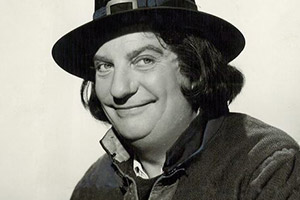
Sid Field
- Actor and comedian
Press clippings
The life of Sid Field
Three films and a scratchy scattering of live performances are all that remain of Field's showbiz legacy.
Mike Lockley, The Birmingham Mail, 7th May 2017Chuckle muscles at the ready, I prepared to be simultaneously tickled and enlightened by David Mitchell's History of British Comedy.
Sadly, however, it turned out to be an all-too-familiar trawl through the early days of music hall, variety and radio, with precious little of the Mitchell magic we know and love from his prolific radio and TV output.
A catch-all documentary series such as this is only really as good as its clips and contributors, so it was disappointing to find Mitchell, or his producer, rounding up the usual suspects - Michael Grade, Barry Cryer, Ken Dodd and token academic CP Lee, all of whose reflections on comedy have been documented to death over the years.
The country must be crawling with people with a different take on early British comedy and its connection to the comedy of today, as well as people in their 70s, 80s and 90s who saw the likes of Max Miller, Sid Field, Robb Wilton and Jimmy James in their heydays. Where were they?
By far the most vivid and original recollections of early comedy came from 91-year-old Denis Norden, a living encyclopedia of British comedy and variety who merits a documentary series to himself.
Nick Smurthwaite, The Stage, 11th March 2013The good news is that David Suchet appears to be better at presenting documentaries than Sid Field. The bad news is that we didn't see much of Sid Field.
However, this is not Suchet's fault, as very little archive footage of him exists. He only made a handful of films, the most famous of which was London Town, a film panned by critics and which fails to show him at his best. Not only that, there is only one existing sound interview with him. Due to the lack of footage, very few people remember him, although he was one of the most popular comedians of his age.
Not only was he incredibly popular, he was an influence on both Tony Hancock and Spike Milligan. He invented character comedy and camp comedy. He was a popular singer and he could also do straight acting, starring in the lead role in the stage version of Harvey.
There was much to like with this show. My favourite titbit from it, mind, was the story of Field's wedding day. As his mother didn't approve of his marriage he got married on the quiet. His wedding day dinner was a cup of tea and some fish and chips from the local chip shop.
The best bit of news from this programme is that a previously lost feature film starring Field called That's The Ticket has been rediscovered, so we can see him perform in a more successful manner.
Ian Wolf, Giggle Beats, 31st October 2011You're entitled to ask why you should be interested in a comedian you've never heard of who died 60-odd years ago. Bob Hope called Sid Field "probably the best comedian of them all". For Tony Hancock, Field was inspirational and David Suchet tells a good story with actorly flourishes. Tragically, scarcely a fragment of Field in action survives. Yet we get a glimmer of how Field created the character-based sketch comedy that's become the norm in British comedy. He also pioneered camp - "the original mince," observes Julian Clary, tartly.
Geoff Evans, Radio Times, 26th October 2011Sid Field may not be known to many today but the music hall star is lauded by comedians for his technique; Winston Churchill and 'Laurence Olivier were among his fans. Despite the lack of archive footage and David Suchet's stilted presentation, Field's innovative style ("the supreme live performer") emerges thanks to the contributions of Paul Merton and Eric Sykes. The film takes in why it took so long for Field to hit the big time, why his switch to big-budget movies didn't work out and why he was so influential.
Simon Horsford, The Telegraph, 25th October 2011The Poirot actor presents this documentary about music hall great Sid Field, having played the Birmingham-bred entertainer in a 1994 musical. He talks to people who worked with Field, including Petula Clark, and fan Julian Clary, and asks why the pioneer of camp and sketch comedy is now remembered by relatively few people. Field sadly died in 1950, and so just missed the advent of popular television. This programme is part of BBC4's season on musical entertainers, which also includes Frank Skinner on George Formby on Thursday.
Julia Raeside, The Guardian, 25th October 2011